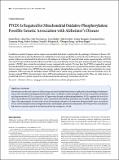PTCD1 is required for mitochondrial oxidative-phosphorylation: possible genetic association with Alzheimer's disease
Author(s)
Fleck, Daniel; Phu, Lilian; Verschueren, Erik; Hinkle, Trent; Reichelt, Mike; Bhangale, Tushar; Haley, Benjamin; Wang, Yuanyuan; Graham, Robert; Kirkpatrick, Donald S; Sheng, Morgan; Bingol, Baris; ... Show more Show less
DownloadPublished version (5.012Mb)
Publisher with Creative Commons License
Publisher with Creative Commons License
Creative Commons Attribution
Terms of use
Metadata
Show full item recordAbstract
In addition to amyloid-[1] plaques and tau tangles, mitochondrial dysfunction is implicated in the pathology of Alzheimer’s disease (AD). Neurons heavily rely on mitochondrial function, and deficits in brain energy metabolism are detected early in AD; however, direct human genetic evidence for mitochondrial involvement in AD pathogenesis is limited. We analyzed whole-exome sequencing data of 4549 AD cases and 3332 age-matched controls and discovered that rare protein altering variants in the gene pentatricopeptide repeat-containing protein 1 (PTCD1) show a trend for enrichment in cases compared with controls. We show here that PTCD1 is required for normal mitochondrial rRNA levels, proper assembly of the mitochondrial ribosome and hence for mitochondrial translation and assembly of the electron transport chain. Loss of PTCD1 function impairs oxidative phosphorylation and forces cells to rely on glycolysis for energy production. Cells expressing the AD-linked variant of PTCD1 fail to sustain energy production under increased metabolic stress. In neurons, reduced PTCD1 expression leads to lower ATP levels and impacts spontaneous synaptic activity. Thus, our study uncovers a possible link between a protein required for mitochondrial function and energy metabolism and AD risk.
Date issued
2019Department
Massachusetts Institute of Technology. Department of Brain and Cognitive Sciences; Picower Institute for Learning and MemoryJournal
Journal of Neuroscience
Publisher
Society for Neuroscience